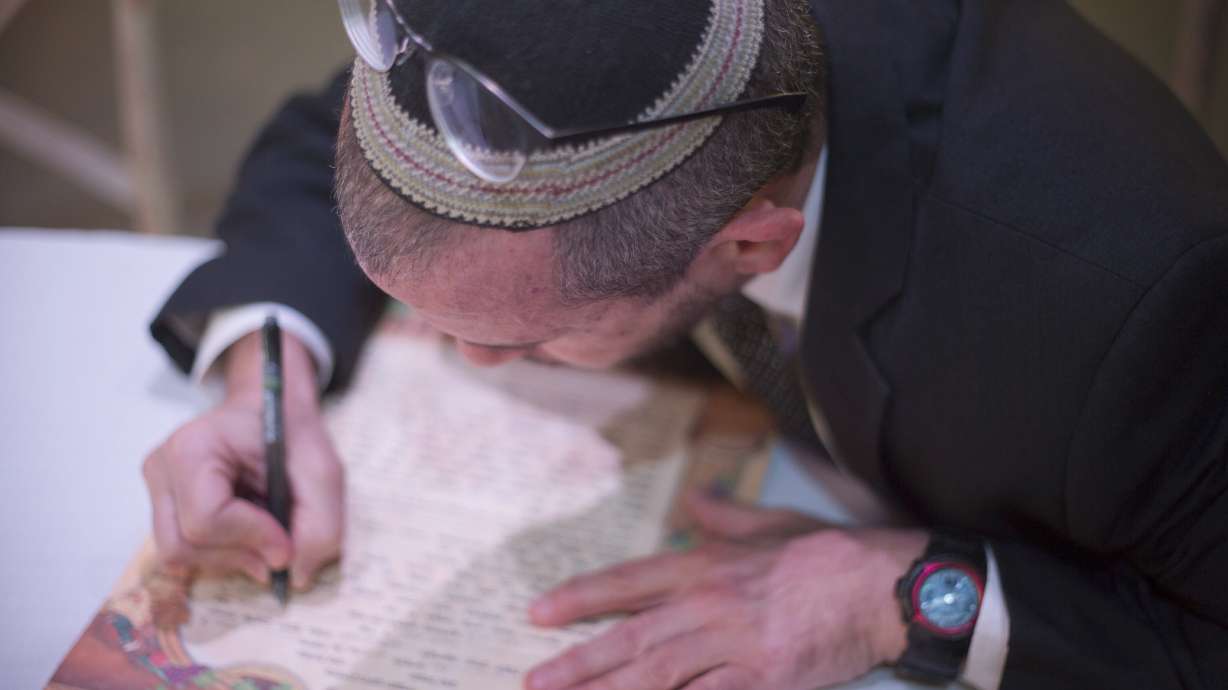Estimated read time: 4-5 minutes
This archived news story is available only for your personal, non-commercial use. Information in the story may be outdated or superseded by additional information. Reading or replaying the story in its archived form does not constitute a republication of the story.
SALT LAKE CITY — Two Utah rabbis joined an administrative petition this week filed against the Israeli Interior Minister and the country's population authority in an effort to lift an order that does not recognize civil marriages for Israeli couples completed through a Utah online system.
In 2020, the Utah County Clerk's Office began offering online marriage license services that later became crucial during the COVID-19 pandemic.
Since then, the marriage license office has helped hundreds of couples get married virtually. In the fall of 2020, Israeli couples began to utilize the system and get civilly married online to avoid the travel usually required to get civilly married in another country.
"You can be standing anywhere in the world and get married, so long as your officiant is standing in the state of Utah and it is a legal wedding inside the state of Utah," Rabbi Samuel Spector of Utah's Congregation Kol Ami explained. Rabbi Spector and Rabbi David Levinksy of Park City's Temple Har Shalom Congregation, have both joined the petition.
Israel carries strict religious rules regarding marriage but recognizes legal marriages done by other states.
It's common for an Israeli couple who are unable to meet the strict rules, or who simply don't want to marry under the orthodox religious restrictions, to travel outside of the country to get civilly married. Rabbi Uri Regev, a lawyer in Israel and leader of Hiddush, a group dedicated to religious freedom and equality in Israel, estimates there are some 600,000 Israelis who cannot legally get married because of the marriage restrictions of their country.
However, once Interior Minister Rabbi Aryeh Deri learned of the practice, he ordered the population authority to stop registering the couples and counting their marriage as legitimate. The petition was filed in an effort to reverse the ban and take it all the way to the country's Supreme Court.
"Loads of Israeli couples who otherwise cannot get married in their country are doing this, and the interior minister of Israel, who's a part of an ultraorthodox Jewish Party is trying to block these marriages, even though they're completely legal (in Utah and Israel)," Rabbi Spector said.
Rabbi Regev filed the petition on behalf of eight couples who were legally married through Utah's virtual system but have not had their marriages recognized in their home country. He believes Rabbi Deri is violating the country's Supreme Court ruling that requires civil marriages done overseas must be registered in Israel.
Rabbi Regev told KSL.com he is confident they will win the lawsuit.
"I've fought many constitutional battles and many many fights for religious freedom," he said. "This is one of the surest lawsuits that I have been fighting. So my assessment is that the court will ultimately accept our lawsuit."
In Israel, marriage rights have been a hotly contested debate for years. The country doesn't permit civil marriages and will not allow religious marriages unless certain criteria are met. For example, both parties need to be Jewish. However, to be considered Jewish, the individual's mother needs to have been Jewish; if the bride or groom's mother wasn't Jewish, then the child is not technically considered Jewish under Israeli law. Interfaith marriages performed in the country are not recognized under Israeli law, however, any civil marriages done outside the country are legally recognized.
"Imagine if you wanted to get married, and you were told, well, your only option to getting married is to leave the country," Rabbi Spector explained. "For some people who don't have the finances for that, that's really hard."
However, the country's Supreme Court ruled some 60 years ago that Israeli law must honor civil marriages completed in different countries. That ruling is why Rabbi Regev feels so confident — a legal marriage performed virtually shouldn't be treated differently than an in-person ceremony, he argued.
"These are perfectly legal weddings recognized under the laws of Utah and, thereby, recognized under the laws of other states and other countries," he said. "Utah County provides an extremely valuable service, not just in terms of enabling couples to marry who cannot marry but in terms of expanding the options that Israeli couples can now have."
Through Utah County's online system, Rabbi Spector recently married an Israeli couple who had lived in the country nearly their entire lives.
"And so because of the accident of birth of who his mother is, he is forbidden to get married inside of his own country," Rabbi Spector said. Instead of having to travel outside of Israel to get married, the couple was able to get married by the rabbi virtually, through Utah. But now, their marriage is not being recognized as valid in Israel.
To Rabbi Regev, providing more flexible options to Israeli couples trying to wed — like Utah County's system — is crucial and a matter of marriage freedom rights.
"This is really a benefit for everybody around, other than those who want to be a theocracy," Rabbi Regev said.









